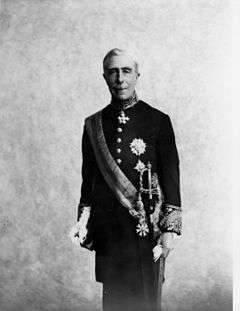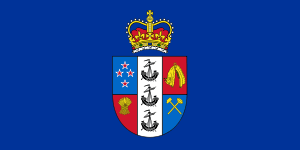Charles Bathurst, 1st Viscount Bledisloe
| The Right Honourable The Viscount Bledisloe GCMG KBE PC | |
|---|---|
|
Formal portrait of Lord Bledisloe in uniform. | |
| 4th Governor-General of New Zealand | |
|
In office 19 March 1930 – 15 March 1935 | |
| Monarch | George V |
| Preceded by | Sir Charles Fergusson, Bt |
| Succeeded by | The Viscount Galway |
| Member of Parliament for Wilton | |
|
In office 15 January 1910 – 15 October 1918 | |
| Preceded by | Levi Lapper Morse |
| Succeeded by | Hugh Morrison |
| Personal details | |
| Born |
21 September 1867 London, United Kingdom |
| Died |
3 July 1958 (aged 90) Lydney, Gloucestershire United Kingdom |
| Nationality | British |
| Political party | Conservative |
Charles Bathurst, 1st Viscount Bledisloe GCMG KBE PC (21 September 1867 – 3 July 1958), was a British Conservative politician and colonial governor. He was Governor-General of New Zealand from 1930 to 1935.
Early life
He was born in London, the second son of Charles Bathurst, of Lydney Park and Mary Elizabeth, daughter of Col. Thomas Hay by Georgette Arnaud. He was educated at Sherborne School, Eton and then University College, Oxford, where he graduated with a law degree in 1890. He then studied law and was admitted to the Inner Temple in 1892, when he gained an MA from Oxford. He was also called to the bar.[1] He inherited Lydney Park on the death of his elder brother.
Member of Parliament and Great War
Bathurst worked as a barrister and conveyancer and in 1910 entered parliament representing the Conservative Party as MP for the South or Wilton division of Wiltshire. After serving as Parliamentary Secretary to the Ministry of Food,
During the Great War he joined the Royal Engineers Special Reserves, and then appointed to Southern Command as Assistant Miitary Secretary at the War Office. he carried the task of ensuring the country had a supply of sugar when asked to chair the Royal Commission on Sugar Supply until 1919. Bathurst was appointed a Knight Commander of the Order of the British Empire (KBE) in 1917, and raised to the peerage as Baron Bledisloe, of Lydney in the County of Gloucester on 15 October 1918. He remained in parliament until 1928, serving as Parliamentary Secretary to the Ministry of Agriculture and Fisheries from 1924 onwards. The following year he granted an honorary Doctorate of Science by Bristol University and was a member of the Privy Council from 1926. Stanley Baldwin appointed Lord Bledisloe to chair the Royal Commission on Land Drainage probably owing to his own experiences on the banks of the Severn in Gloucestershire. But it was his last such honour until being posted overseas.
Governor-General of New Zealand
After leaving parliament, Lord Bledisloe was created a Knight Grand Cross of the Order of St Michael and St George and invested a Knight of Grace of the Order of St John of Jerusalem on appointment as the fourth Governor-General of New Zealand, an office he held from 1930 until 1935, proving to be extremely well liked and respected. His social conscience was much appreciated during the Depression era, as was his insistence that his salary should be cut as were the salaries of public servants at the time. Bledisloe also contributed to improved Pākehā – Māori relations, purchasing the site where the Treaty of Waitangi was signed and presenting it to the nation as a memorial. In 1934, the site was dedicated as a national reserve. The dedication ceremony attracted thousands of people, both Māori and Pākehā. Bledisloe continued to take an interest in the site even after his term expired and he returned to England. Bledisloe also contributed to the recognition of the Māori King Movement by developing a friendship with King Koroki and Te Puea Herangi, and his willingness to use the title "king" without reticence.[1]
Bledisloe also promoted various causes and events by the presentation of trophies, the most famous of these being the Bledisloe Cup, the trophy for an ongoing rugby union competition between New Zealand and Australia, first awarded in 1931, and currently contested annually.[1]
In 1935, he was awarded the King George V Silver Jubilee Medal.,[2] and honorary doctorate of civil laws (DCL) from Oxford, and honorary doctorate of Law (LLD) from Edinburgh. Upon returning to England he was also elevated on 24 June 1935 to Viscount Bledisloe, of Lydney in the County of Gloucester.[1] He continued to serve on a number of committees and councils, and was made a fellow of University College, Oxford and Pro-Vice Chancellor of Bristol. He received the King's Coronation Medal from George VI in 1937; being admitted at the same time as Fellow of the Society of Antiquaries.
Bledisloe was a director of LLoyds Bank and the Australasian Mutual Provident Society; and latterly also of the P & O Steamship Company.
On his 90th birthday he endowed the Bledishoe Gold Medal for Landowners of the Royal Agricultural Society of England to be awarded annually for the application of science or technology to some branch of British husbandry.[3]
Lord Bledisloe died, aged 90, at Lydney on 3 July 1958, and was succeeded as Viscount Bledisloe by his eldest son, Benjamin Ludlow Bathurst.
Freemasonry
He was a freemason. During his term as Governor-General (1930-1933), he was also Grand Master of the Grand Lodge of New Zealand.[4]
Family
Charles Bathurst married Hon Bertha Susan, daughter of Henry Charles Lopes, 1st Baron Ludlow by Cordelia Clark. They had issue: two boys and a girl. 1.Benjamin Ludolow, 2nd Viscount Bledisloe (1899-1979) 2.Hon Henry Charles Hiley (1904-1969)
1.Ursula Mary married John F Parshall
Sports
Upon its formation in 1888, Bathurst was invited to become President of Lydney Rugby Football Club. He held this position for 70 years until his death and was succeeded as by his eldest son, Benjamin Ludlow Bathurst. The Bledisloe Cup and Bledisloe Park sports ground are both named for Bledisloe.
Styles
- 1867–1910: Charles Bathurst
- 1910–1914: Charles Bathurst, MP
- 1914–1917: Captain Charles Bathurst, MP
- 1917–24 October 1918: Captain Sir Charles Bathurst, KBE, MP
- 24 October 1918 – 1926: The Right Honourable The Lord Bledisloe, KBE
- 1926–1930: The Right Honourable The Lord Bledisloe, KBE, PC
- 1930-1 January 1935: His Excellency The Right Honourable The Lord Bledisloe, GCMG, KBE, PC
- 1 January – 28 June 1935: The Right Honourable The Lord Bledisloe, GCMG, KBE, PC, KStJ
- 28 June 1935 – 1958: The Right Honourable The Viscount Bledisloe, GCMG, KBE, PC, KStJ
Arms
 |
|
References
- 1 2 3 4 Marshall, Russell (22 June 2007). "Bledisloe, Charles Bathurst 1867 – 1958". Dictionary of New Zealand Biography. Retrieved 11 November 2010.
- ↑ "Official jubilee medals". Evening Post. 6 May 1935. p. 4. Retrieved 2 July 2013.
- ↑ "Bledisloe Gold Medal for Landowners". RASE. Retrieved 17 December 2014.
- ↑ "VICE REGAL GRAND MASTERS - WHO AND WHY?". Kent Henderson Freemansonry.
External links
- Hansard 1803–2005: contributions in Parliament by the Viscount Bledisloe
- Lydney Rugby Football Club
| Parliament of the United Kingdom | ||
|---|---|---|
| Preceded by Levi Lapper Morse |
Member of Parliament for Wilton 1910–1918 |
Succeeded by Hugh Morrison |
| Government offices | ||
| Preceded by Sir Charles Fergusson |
Governor-General of New Zealand 1930–1935 |
Succeeded by The Viscount Galway |
| Sporting positions | ||
| New office | President of Lydney Rugby Football Club 1888–1958 |
Succeeded by Benjamin Bathurst |
| Peerage of the United Kingdom | ||
| New creation | Viscount Bledisloe 1935–1958 |
Succeeded by Benjamin Bathurst |
| Baron Bledisloe 1918–1958 | ||

